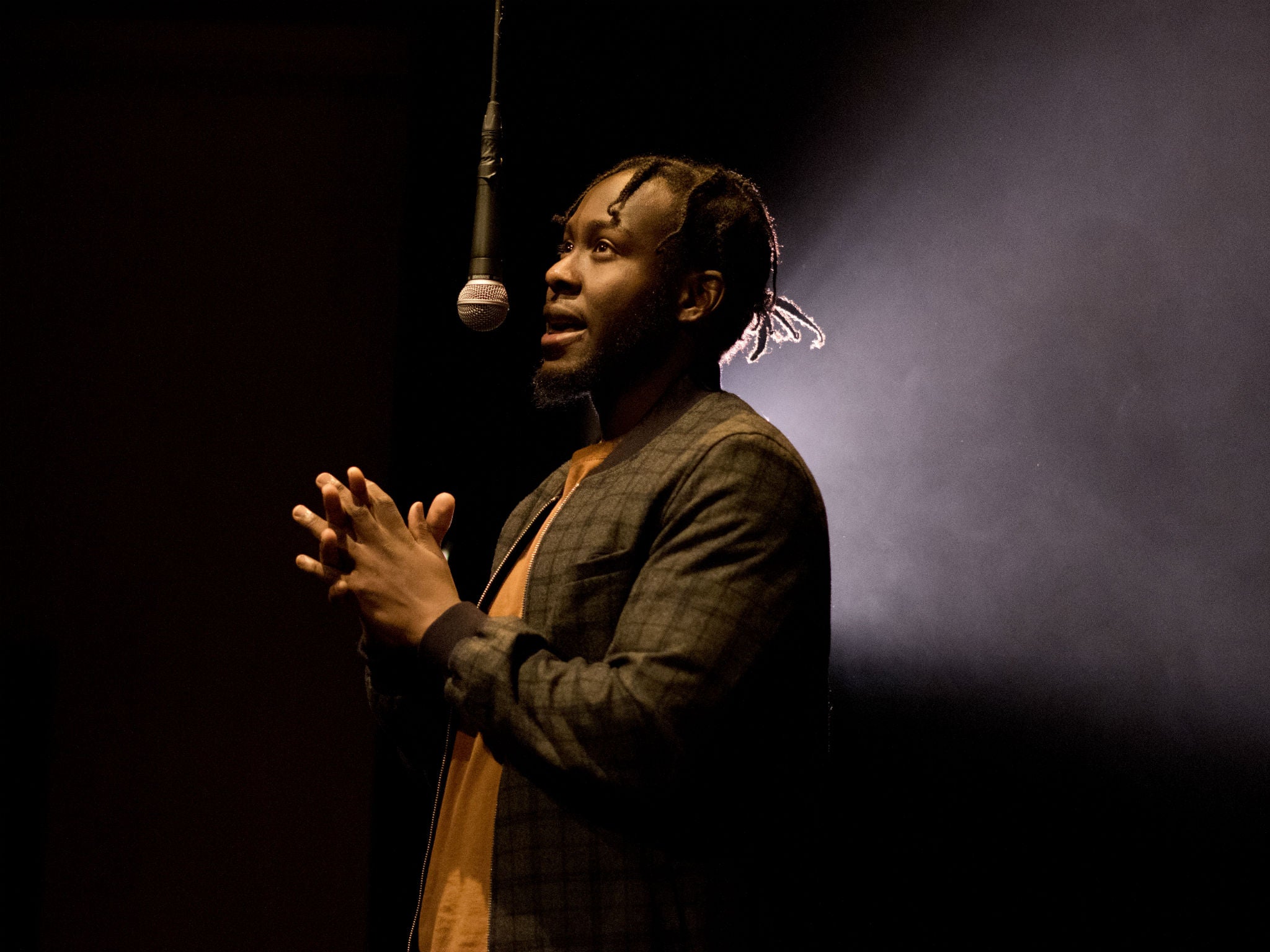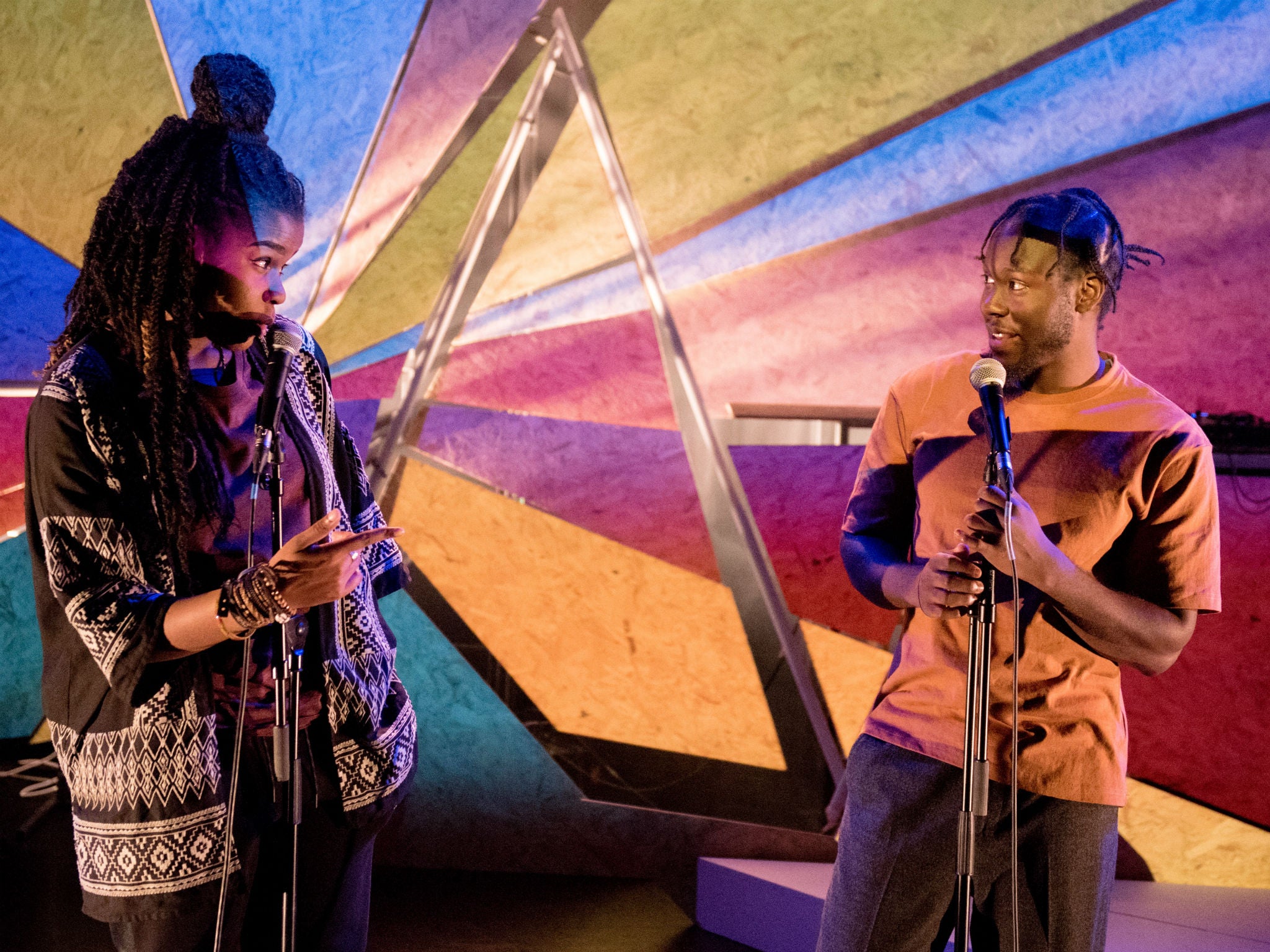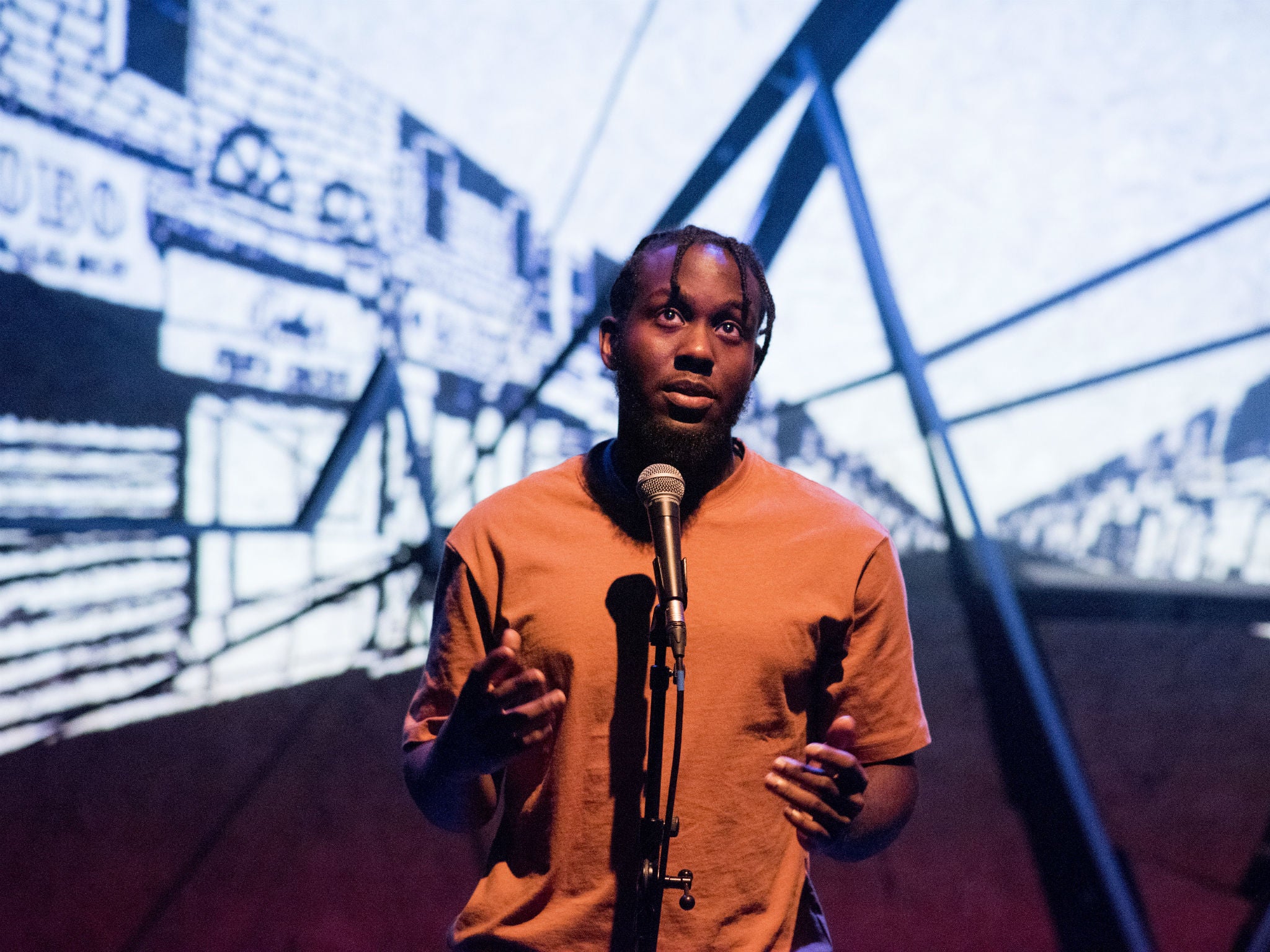Poet Caleb Femi was shot and almost killed as a teenager. Now his new play reveals how reading Frankenstein gave him new life
The former Young People's Laureate for London on how literature, poetry and theatre can change young people's lives

“I beheld the miserable monster whom I had created...” Goldfish Bowl, the new play by Caleb Femi – former young people’s laureate for London – opens with this quote from Frankenstein – the moment the monster comes to life.
The play, which opens at Battersea Arts Centre in south London this week, explores the writer’s own life journey, from leaving Nigeria for an estate in Peckham as a child, his teenage involvement with drug dealing and gang violence, through to discovering literature and becoming a poet and a teacher.
And it was Mary Shelley’s Frankenstein that transformed him, reawoke him: Femi read the whole book in a day in hospital. His girlfriend was studying it for A-levels and had left it by mistake on his bedside table.
It was the beginning a love affair with literature that has seen this 28-year-old become poet in residence at St Paul’s Cathedral and have his words emblazoned on the windows at Selfridges, perform at Tate Modern and record a poem – “A Tale of Modern Britain” – to greet travellers at Heathrow’s arrivals lounge.

Femi had would up in hospital, aged 17, because he’d been shot in the leg. Yet even this was, in fact, an incredible stroke of good fortune – minutes before, a gun had been held to the back of his head, and the trigger pulled.
It jammed. Femi scarpered, a follow-up shot hitting his leg.
This narrow escape was a wakeup call. “It was just a random altercation that went really far. It had nothing even to do with me – I was just in the wrong place at the wrong time with the wrong person.
“It was normal to me to see friends get shot, and to die. Then in that moment in hospital I thought: this is not normal. And then I read the book.”
Frankenstein changed his life. “I read loads after that, but it was poetry that really grabbed me,” he recalls. “Growing up I had an obsession with lyrics anyway, so it made sense. Reading TS Eliot for the first time blew me away – ‘where has this been all my life?’”
He hoovered up Wordsworth, Robert Frost, Emily Dickinson, WB Yeats – a stodgily white Western canon that “now I really roll my eyes at, because I believe in having a wider list of poets to read”, he explains. At the time, he loved it all.
Femi went to a new sixth form in Euston – “You have to physically remove yourself; I was going to sixth form under pretence of being a normal lad, I’d tell loads of lies of where I was from” – before going on to get a degree and masters in English.
And Femi has since made it his mission to use words to connect with and change the lives of other young people. That might be through teaching in schools, running poetry competitions and workshops, or just trying to make the art forms he loves – poetry and theatre – as accessible as other, more popular mediums he works in: music and film.
For Femi’s outputs is heavily interdisciplinary. Goldfish Bowl, for instance, mixes performance poetry with live music from rapper Lex Amor and projected illustrations by Olivia Twist.
Femi’s story is pretty astonishing – but he is extremely, and understandably, wary of being narrowly defined by this small part of his life. Goldfish Bowl, being about identity, explores much more than just drugs’n’guns: his Nigerian roots, falling in love with London, multiculturalism, his passion for music, teenage romances, the education system, and his experience of becoming a teacher.
But he also had to face those more traumatic elements. “Before I could tell any other types of stories – which I plan to – I had to tell this one,” he says.
Until this play – which is in part about the struggle to be open and honest about who you are – he’s attempted to keep pretty quiet about his teenage years. “It’s so easy for it to end up being all you are.”
He’s also wary of estate life and gang violence being the only sorts of stories we hear about young black men.
“But it’s not like I’m glorifying it; it’s more interrogative,” he suggests, adding that we do also need greater understanding of the situation. His description of how he ended up in a gang is useful just for its calm, lucid simplicity.

“It’s like this: certain things get normalised from a young age. Seeing police tape. Hearing sirens. Seeing violence. Hearing of violence. Hearing of death. Seeing death.
“You have a group of friends – they’re just friends, your friends. You stick with them. And the more you stick with them, the more you’re associated with your friends. You grow up not really knowing you’re ‘a gang’ – not in the way it’s usually portrayed. If someone troubles your friend, if someone stabs your friend, you’re going to get involved. It happens like that. And before you know it, you’re swept away.”
On the subject of the recent rise in knife crime in London, Femi lays the blame on funding cuts – to police services, but also to councils, who are no longer to provide spaces, activities, or support for young people.
He observes that, in the run-up to and during the Olympics – when the eyes of the world were on London – money was pumped into initiatives and grassroots community organisations, and knife crime went down.
“It’s almost as if they do actually know how to deal with it,” he adds, with heavy irony.
The real catalyst for gang violence is boredom, and a lack of opportunities: “A lot of the issues wouldn’t happen if young people had things to do.”
And, as someone who was so obsessed by first music then poetry, he thinks the arts can really help.
“I had no idea [when I was a teenager] you could just go to a gallery. I work with a lot of middle class young people now and they’ve seen so many things in their life – they’ve gone to the theatre, they have confidence. Then the total opposite: you meet a 15-year-old who’s never been out of Barking.”
He thinks a lot of young people would come to the theatre if they could afford it, and sees cheap and free ticket schemes as vital.
But he’s also cheered at the recent burst in the popularity of poetry – once seen as a rarefied, elitist art form, it’s now spawning best-sellers and going viral. Naturally, this has also caused a somewhat snobbish backlash – but Femi is laissez-faire about the situation.
“Whatever you’ve got to say, let’s have this conversation, because it’s enriching for poetry – how it exists, who gets to call the shots on what it should and shouldn’t be,” he says. “I love the fact social media’s having such an impact.”
And anyway, just as our tastes in music or novels change as we get older, so too may a teenage passion for Rupi Kaur turn into an appetite for perhaps more challenging work. “A lot of poems that 12-year-olds like make me cringe a bit – but if I was that age that’s what I’d be into,” Femi says.
Hopefully teenagers will find plenty to enjoy in Goldfish Bowl. And the show itself is about this process of growing up, of finding out who you really are.
While the play’s engagement with Frankenstein began because that happened to be the book Femi picked up in hospital, it’s thematic resonances have come to seem spookily appropriate to his own story.
“That sense of new life, of identity: Frankenstein’s monster finds himself in a place where he has to look at himself through the lens of other people – and towards the end, he realises he doesn’t haven’t to do that,” says Femi. The story becomes about saying to the world “I can determine who I am and what I do. I liked that sense of self-discovery.”
‘Goldfish Bowl’ is at Battersea Arts Centre till 16 June (bac.org.uk)
Join our commenting forum
Join thought-provoking conversations, follow other Independent readers and see their replies
Comments